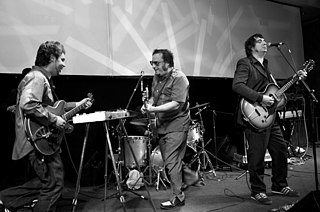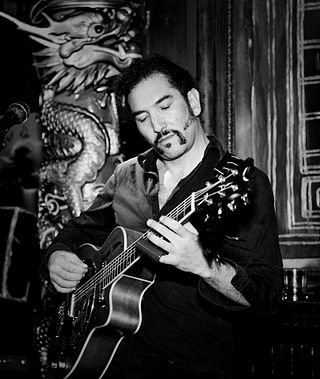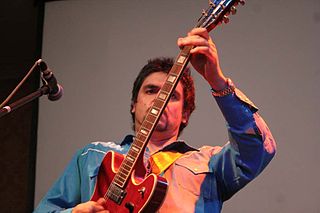
The music of Mexico is very diverse and features a wide range of musical genres and performance styles. It has been influenced by a variety of cultures, most notably deriving from the culture of the Europeans, Indigenous, and Africans. It also sometimes rarely contains influences from Asians and Arabs, as well as from other Hispanic and Latino cultures. Music was an expression of Mexican nationalism, beginning in the nineteenth century.

Los Tres also known as The Tr3s or The 3, is a Chilean rock band. The band was formed in 1987 in Concepción by Álvaro Henríquez, Roberto Lindl, Francisco Molina and later Ángel Parra Jr. joined. They are one of the most influential rock en español bands.
Chilean music refers to all kinds of music developed in Chile, or by Chileans in other countries, from the arrival of the Spanish conquistadors to the modern day. It also includes the native pre-Columbian music from what is today Chilean territory.

Norteño or Norteña, also música norteña, is a genre of regional Mexican music. The music is most often based on duple and triple metre and its lyrics often deal with socially relevant topics, although there are also many norteño love songs. The accordion and the bajo sexto are traditional norteño's most characteristic instruments. Norteña music developed in the late 19th century, as a mixture between local Mexican music and Austrian-Czech-origin folk music.
Chilean rock is rock music and its corresponding subgenres produced in Chile or by Chileans. Chilean rock lyrics are usually sung in Spanish so can be considered as part of rock en español, although sometimes are sung in English as well.

Los Prisioneros were a Chilean rock/pop band formed in San Miguel, Santiago, in 1983. They are considered one of the most important Chilean bands, and one of the strongest musical influences that Chile has made to Latin American music. In addition, they are considered pioneers of Rock en español by Latin American media and musicians, and the band with strongest socio-political impact in Chile. Their roots date back to March 1979, when their core members entered high school. From their beginnings in 1983 at the Festival de la Canción del Colegio Miguel León Prado to their first limited release album in Chile under the record label "Fusión Producciones", they struggled to make themselves known until they were able to sign with EMI Records in 1985, re-releasing their first album on LP record and cassette. From that point on, they reached mainstream success in Chile, then in Peru. Los Prisioneros created a simple punk sound with a mix of rockabilly, reggae, and then pop rock and synthpop.

Bomba Estéreo is a Colombian band founded in Bogotá in 2005 by Simón Mejía. Their music has been described as "electro tropical" or "psychedelic cumbia".

Pateando piedras is the second studio album by the Chilean group Los Prisioneros. It was released on September 15, 1986 in cassette format in Chile and 12-inch vinyl in South America. It was the group's first album to be released by a multinational company. It sold five thousand copies in its advance sale, and reached ten thousand units sold in a short time. The album was preceded by the hit single, "Muevan las industrias", which featured the group drawing European techno influences from bands like Depeche Mode.

Congreso is a musical band from Chile. Founded in 1969 in Quilpué, it is a highly acclaimed band with over 50 years of experience fusioning and developing Latin American music.

Fulano was a Chilean rock band. They were one of the most important bands in the development of jazz-rock in Chile or, as described by musicologist Juan Pablo González, of "anti-hegemonic eclecticism". With an oeuvre consisting of six high quality and virtuosic albums, they have been widely recognised as pillars of jazz-rock and experimental music in Latin America.
Banda Conmoción are a Chilean ensemble band who mix cumbia and gypsy music with genres such as ska and cha-cha-cha. They are part of the new Latin-American fusion movement and emerged in the early nineties along with groups like Chico Trujillo and La Floripondio. They are also considered part of the New Chilean Cumbia movement.

Harold Hopkins Miranda (born 1971 in San Juan, Puerto Rico is a Puerto Rican bass player, composer, director and founder of the progressive metal band Puya. Hopkins Miranda is largely responsible for creating Puya's style, a fusion of jazz, salsa and heavy metal. Hopkins Miranda and guitarist Ramon Ortiz are the composers of most Puya's songs. Hopkins Miranda is also a developing music producer and plays, composes and directs other musical projects. He is currently the bass player for De La Tierra.

Caballeros de la Quema is an Argentine rock band, led by Iván Noble.

Daniel Puente Encina is a Chilean singer-songwriter, guitarist, film composer, producer and actor known for his bands such as the anti-fascist Pinochet Boys from Santiago de Chile, Niños Con Bombas from Hamburg and Polvorosa from Barcelona, where he currently lives.
Entrama is a Chilean music group that since its inception in 1997 develops instrumental music, fusing styles such as Latin American music of folkloric origin, with jazz and classical music, mainly using compositional techniques derived from the latter. It has also been catalogued as world music. According to the specialized critics they have been called as popular musicians for refined and demanding listeners.

La Marraqueta is a Chilean jazz fusion band formed in Santiago, with a mixture of folk music and Mapuche music, as well as rock. They have been called as Jazz Fusion Criollo.
La voz de los '80 is the debut studio album by the Chilean band Los Prisioneros, released independently under the Fusion label on December 13, 1984. Produced by leader, vocalist, and songwriter Jorge González, who credited it to the name of the band. A thousand copies were released in cassette format at its launch, today these cassettes are considered cult objects of Chilean rock. In 1985, Los Prisioneros signed a contract with EMI Odeón Chilena, who relaunched La voz de los '80 nationally and with Latin American projection that year, managing to sell around 100.000 in Chile do you copy.

Ángel Parra Trío is a Chilean jazz band led by guitarist and composer Ángel Parra Jr. and created in 1989.

Sergio Hernán González Morales, better known as Tilo González, is a Chilean drummer, percussionist, composer and arranger. Founding member of the prestigious Latin American fusion band Congreso, which he has led for over 50 years. The Rock Workers Association (ATR) recognized him in 1996 as the best drummer in Chile; although he is also one of the most extraordinary composers in the country, which he has demonstrated after a vast career as a composer, arranger and drummer of Congreso since its inception in 1969.
Los Beat 4 is a Chilean rock band from that enjoyed early success in the 1960s and early 1970s, influenced by the wave of Beatlemania. Among their contributions to Chilean music is recording one of the first Chilean rock albums recorded in Spanish, Boots A Go-Go.














